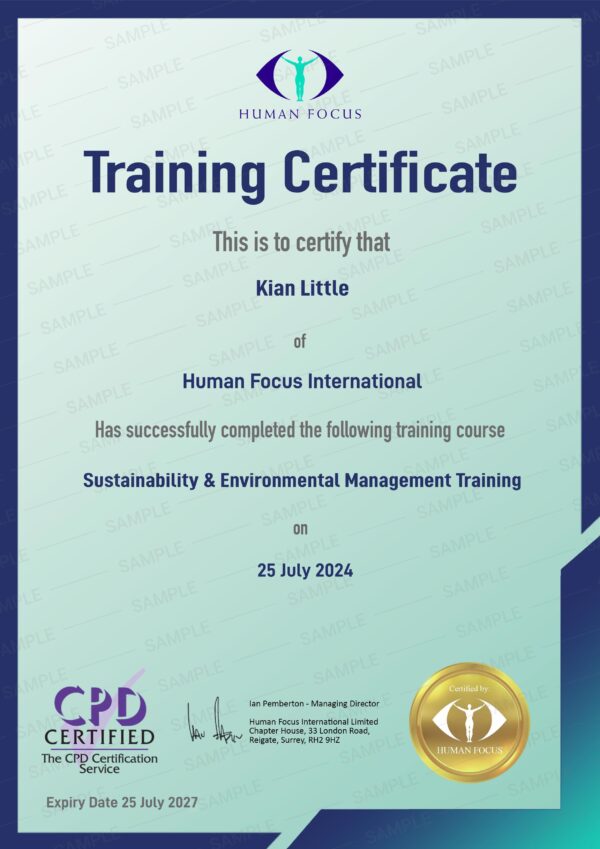Rising prices for resources, environmental legislation and a competitive marketplace are making it increasingly clear: sustainability operations are no longer an optional activity. Organisations that wish to be successful must have in place a powerful environmental management system.
Creating a sustainable environment is crucial for future generations. Non-compliance with environmental regulations can lead to penalties or reputational damage. However, establishing and documenting such a system is a challenge.
Our course provides comprehensive information to help you implement sustainable practices, improve environmental performance and comply with environmental standards.
Benefits of Sustainability and Environmental Management Training:
- Guides managers to create sustainability plans that help tackle carbon emissions, improve resource efficiency and minimise the environmental impact of business activities
- Supports compliance with environmental legislation and regulations to protect organisations from potential legal or reputational harm
- Proves corporate responsibility and commitment to environmental protection, impressing stakeholders, winning customers and contributing to a sustainable future
What are your Responsibilities Under Sustainability and Environmental Training?
Organisations in the UK must operate under several key pieces of environmental legislation, including the:
- Environmental Protection Act 1990
- Climate Change Act 2008
- Environment Act 2021
The individual acts cover different environmental impacts of business activity and each places significant obligations on organisations, including the duty to:
- Control pollution, improve resource efficiency and avoid waste
- Dispose of waste responsibly and consider the entire lifecycle of waste
- Contribute to a 78% reduction in carbon emissions by 2035 and a 100% reduction by 2050, compared to 1990 levels
- Prevent any reduction in air or water quality
- Protect wildlife from the consequences of their activities
- Increase recycling levels within their organisation
- Reduce plastic waste
- Provide evidence for any environmental protection or sustainability claim
And as demands for environmental action increase, it’s likely these duties will expand. The Environment Act 2021 itself is known as ‘enabling legislation’, which paves the way for further requirements.
Sustainability and Environmental Management Training supports organisations in meeting current requirements and creates frameworks to support future environmental improvements.
About Sustainability and Environmental Management Training:
The world’s climate is changing. Average temperatures are soaring, extreme weather events are happening more often and ecosystems are collapsing. The impact of business activity across the globe is driving this change. Without urgent reforms, the worst outcomes of climate change may soon be realised, with plummeting biodiversity, natural resources and limited access to water and food.
And as urgency is increasing, so is the legislative focus on environmental management and global agreement on carbon reductions. The Kyoto Protocol set out carbon management targets for all economically developed nations. This agreement is now superseded by the Paris Agreement, which calls on every nation to work towards agreed emission-reduction pledges. This commitment requires governments to set carbon targets upheld by legislation.
For UK businesses, this means increased reporting requirements and compliance with the government’s Net Zero Strategy: Build Back Better, which aims to reduce carbon emissions across the entire economy and drive green investment, skills and industries.
As part of this initiative, businesses must commit to net zero before bidding on any major government contracts. Larger organisations must also publish data on annual energy use and greenhouse gas emissions. Smaller companies can choose not to share this information publicly, although it is possible this may change in the future.
This online training course helps leaders reduce their ecological impacts and contribute towards a sustainable future, while promoting resource efficiency and compliance with environmental regulations. Modules cover key areas of environmental management, including carbon emission management, resource efficiency, waste reduction and green technologies, letting you create an Environmental Management System (EMS) specific to your organisation.








